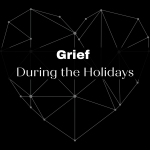Grief at Christmas
Coping with grief during Christmas and other holiday celebrations:

As 2020 wraps up, it can only be described as a year that was anything but normal. Of all the memes that have come out of this year, by far my favorite is the one that reflects “my plans”, and the other side 2020 as depicted by Leonardo DiCaprio’s character from Django Unchained smuggly sipping his drink almost mocking our naivety. For many though, it’s been a year of cancellations, job losses, rights of passage lost, isolation, loss of community, loss of traditions and for some, loss of loved ones.
Grief can be experienced from any of these losses and what I see more frequently is people comparing their loss and suffering to others and minimizing their own experience. Minimizing your own experience doesn’t change the experiences of others and we can still keep our struggles in perspective while allowing ourselves the chance to emotionally process what’s happened.
For some however, this holiday season will be a reminder of who will not be with us and traditions that won’t feel the same. Recognizing the grief you’re experiencing is important to processing and finding the path forward.
Recognize the grief cycle
In 1969, a Swiss psychiatrist working in a terminally ill individuals, Elisabeth Kübler-Ross first described the stages of grief (Gregory, 2020). They included:
- Denial: Avoidance, shock, fear and confusion.
- Anger: frustration, anxiety and irritation
- Bargaining: Struggling to find meaning, reaching out to others, or sharing one’s story
- Depression: Hopeless, overwhelmed, helplessness, or hostility
- Acceptance: Exploring options, putting a new plan in place, and moving on
These stages aren’t linear, they also don’t always happen, but mental health professionals all agree, each stage is important, has a purpose, and needs to be encouraged to express (Layne,2020).
Coping during the Holidays
First off, whatever you are going through and whatever you have lost this year, you are not alone! If you need someone to talk to, insurance companies have now made mental health counseling so much more accessible; even if you don’t have the ability to leave your home, you can still get help.
Beyond that, here are some tips with dealing with grief in other practical ways.
- Find a new tradition to implement. Whatever or whomever you lost, maybe doing what feels traditional is also incredibly painful. Someday maybe you’ll be able to do those traditional things again, but for now, it’s ok if you create something different or with a different meaning.
- Focus on what you need to do next. Getting caught up on what you are missing out on or what you’ve lost can get overwhelming fast. Make sure you try to redirect your attention to the present, and focus on what you have to do next- nothing is too small or insignificant. Maybe the next thing is just standing up or taking a shower. Compartmentalize yourself to that one moment in time. Then move on to the next thing.
- Plan Ahead. Creating a schedule for the next day or week can help keep you on track. This can also prevent last minute scrambling and creating more overwhelming feelings. (Mayo Clinic)
- Write a goodbye letter. This is something I will often have my clients do for many kinds of losses. Loss of relationship, loss of identity, loss of unhealthy coping strategies, or loss of experiences you should have had. A goodbye letter can focus on what you feel as a result of what you lost: something you miss, something you wish you could have said or done with whom or what you lost, how you feel saying goodbye, how you will be different, and/or why you need to say goodbye.
- Think about how you can honor a memory. Whether this is someone that has physically passed on this year or whom you won’t be near due to risk factors, think about how you can make meaning and purpose of your situation.
- Volunteer. Serving others can get you out of your world and help others who are also in need.
“Empathy is not a finite resource. Love doesn’t need to be rationed. Pain is pain, no matter how it stacks up against another’s. And everyone deserves to feel their feelings.”
Erica Layne
Above all, practice patience and forgiveness this holiday season. It has been a tough year for most people.
If you are struggling with a loss of your own or with how to help a loved one through a loss, we are here for you! At New Life Counseling we offer in person or telehealth counseling. Contact us today to schedule an appointment.
This article was written by Emilie LeLaCheur. Emilie is no longer with New Life Counseling.
Sources:
- Gregory, Christina. “Five Stages Of Grief – Understanding the Kubler-Ross Model.” Psycom.net
- – Mental Health Treatment Resource Since 1996, 23 Sept. 2020, www.psycom.net/depression.central.grief.html.
- Layne, Erica. “Let’s Opt out of the Hardship Olympics-Everyone’s Loss Is Valid Right Now.” The Life On Purpose Movement, 11 Aug. 2020, ericalayne.co/comparative-suffering/.
- “Tips for Coping with Holiday Stress.” Mayo Clinic, Mayo Foundation for Medical Education and Research, 11 Nov. 2020, www.mayoclinic.org/healthy-lifestyle/stress-management/in-depth/stress/art-20047544.

